- Wednesday, 25 February 2026
Autistic children deprived of proper education
Kathmandu, Nov. 2: Nine years ago, Kavita Dhakal from Biratnagar noticed unusual behaviour in her son when he was 18 months old. She visited several doctors to seek treatment for him. One doctor advised her to consult a neurologist regarding her son’s behavioural issues.
When she visited doctors in Kathmandu, she came to know that her son had autism spectrum disorder. The diagnosis was extremely new and unexpected for Kavita and her husband.
After discovering that her son was autistic, she took him to India for further treatment. In New Delhi, she consulted at least four doctors, who advised her to join a therapy course. She then spent a month taking a special training course there. After returning from New Delhi, she decided to live in Kathmandu with her son and provide him with therapy herself.
“It was a shocking moment for me. When I was moving forward with my career, my son’s health condition turned my life in a completely new direction. I received a therapy course designed specifically for parents of autistic children. Now, I closely observe his behaviour and guide him accordingly,” said Kavita.
Kavita said that when she started living in Kathmandu, she took her son to several schools for admission. However, no school accepted him as a student.
After numerous rejections, she began teaching her son at home. Finally, she found a school dedicated to autistic children, the Avaani Foundation in Hadigaun, Kathmandu.
She enrolled her son at Avaani and later joined the same organization as an employee. “That helped me care for my son and work with other autistic children as well,” said Kavita.
In the meantime, Kavita received several certifications and training courses related to teaching autistic children. This is how an ordinary mother changed her dream to help other children.
There are tens of thousands of parents who are struggling with their children’s autistic conditions while searching for suitable schools. Many parents, including Kavita, complain that the government has not adequately addressed the right to education for autistic children. Dr. Sunita Maleku Amatya, a senior oncologist at Nepal Cancer Hospital, Harisiddhi, Lalitpur, has also been coping with her son’s autism for more than two decades.
Dr. Amatya observed that her 2-year-old son exhibited unusual behaviours, such as squatting, being non-responsive, and engaging in one-sided communication. Following these observations, she visited several pediatricians, who referred her to neurologists. When a neurologist confirmed that her son had autism, it was something very new even for her as a doctor in 2007.
Although a medical doctor, Amatya didn’t realize that autism was a medical condition until she met the neurologist.
After the diagnosis, Dr. Amatya went to India for her son’s therapy. She visited therapy specialists in New Delhi and took a three-month special training course designed for parents of autistic children.
After completing the therapy in New Delhi, Dr. Amatya returned to Kathmandu with her son and tried to enroll him in a school that offered both education and special therapy for autistic children.
However, despite months of efforts, she failed to get him admitted to a regular school. “I visited dozens of schools for my son’s admission, but not a single one was ready to accept him. The rejections were heartbreaking,” Dr. Amatya said. During that time, Dr. Amatya met Dr. Hem Sagar Baral, who has also an autistic child. A renowned bird-watching guide, Dr. Baral had been dealing with his daughter’s autism. Dr. Baral had already established an organization named Autism Care Nepal.
In 2004, Dr. Baral was invited for a breakfast by a UK-based friend, who was also a bird expert. He declined the invitation, explaining that his daughter could not sit patiently in one place. Until then, he had no idea what autism was. After he described his daughter’s unusual behaviour, his friend guessed that she might be autistic and advised him accordingly.
Dr. Baral and his wife spent years searching for a therapy centre . Finally, in 2008, he established Autism Care Nepal, which he later handed over to Dr. Amatya. Over time, Autism Care Nepal has expanded to all seven provinces, providing therapy and education for autistic children.
What is autism and how to deal with it
According to experts, Autism or Autism Spectrum Disorder (ASD) is a lifelong neurodevelopmental condition rather than a disease. The exact cause of autism is not known yet, but various research studies suggest it results from a combination of genetic and environmental factors.
Experts say that there is no complete cure for autism; however, regular therapy can help improve the condition. Autism is a heterogeneous condition, meaning it shows a variety of symptoms that may not be equally noticeable in every child.
Some symptoms appear early in life, even before the age of one. Generally, autism can be diagnosed after the age of two.
Major symptoms before the age of two include repetitive body movements, avoiding or not maintaining eye contact, and not responding to questions.
After the age of two, symptoms may include self-harming behaviour, self-isolation, lack of communication through gestures or words, and discomfort in groups.
A recent study conducted by Autism Care Nepal found that there are at least 300,000 autistic children in Nepal. However, most of them remain out of school. Those who attend regular schools often face harassment and discrimination.
“A serious concern is that the Nepal government did not recognize autism as a health condition for a long time. After years of advocacy, the constitution now includes autism as a health condition and provides a small allowance along with an identity card. However, the government still fails to ensure autistic children’s right to education,” said Dr. Sunita.
A few months ago, then-Health Minister Pradip Paudel announced that the government would establish a dedicated autism school in Kathmandu.
However, a senior official at the Health Ministry confirmed that establishing schools is not under the Health Ministry’s jurisdiction.
Speaking to The Rising Nepal, the official said the ministry is only providing logistical support to a privately run school.
Accordingly, a research study has been completed by the Ministry of Health and Population, which is yet to be fully reviewed and implemented as an action plan, according to a Health Ministry official.
Shiva Prasad Sapkota, spokesperson for the Ministry of Education, Science, and Technology, stated that there is currently no concrete plan regarding an autism school.
Many experts argue that running dedicated schools for autistic children is highly expensive and could isolate them from society. Instead, they suggest an integrated model in which schools hire at least one certified therapist. “If a school can hire a taekwondo or dance instructor, why can’t it hire an autism therapist?” said Dr. Amatya.
Meanwhile, Kathmandu Metropolitan City had announced plans to run at least two dedicated autism schools in the city.
However, the announcement made by Mayor Balen Shah two years ago has yet to be implemented.
Speaking to The Rising Nepal, Sasmit Pokharel, an advisor to the Mayor, said that they are currently reviewing a report from an expert team regarding the establishment of the autism schools.
What is PCT, and why is it necessary?
Experts agree that autism affects not only children but also their families. Every autistic child needs special care and full parental support.
Given this situation, experts suggest that every parent of an autistic child should receive special training known as Parent-Child Training (PCT), which is widely recommended.
Kavita, mother of an autistic child, said this training helped improve her 9-year-old son’s condition. Similarly, Dr. Amatya said that after receiving special parent training in New Delhi, she was better able to manage her son’s behaviour.
An effort to make autistic children self-reliant
Aakar Foundation and Artudio jointly organized an art exhibition dedicated to autistic children in Lalitpur last week, aiming to promote lifelong self-reliance.
Aakar Foundation has been working to explore the hidden talents of autistic children and help them reach the global stage.
At least 24 autistic artists exhibited their paintings at the event, and some of the artworks were sold. Members of the Aakar Foundation plan to promote and sell these paintings in international markets as well.
Though this was the first such attempt, the initiative has shown that autistic children can sharpen their talents and gain global exposure through such exhibitions, members of the Foundation said.
Similarly, Artudio has also been working to advance the artistic talents of autistic children by teaching them artwork.


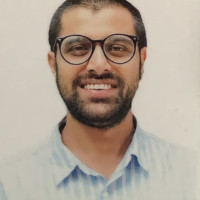
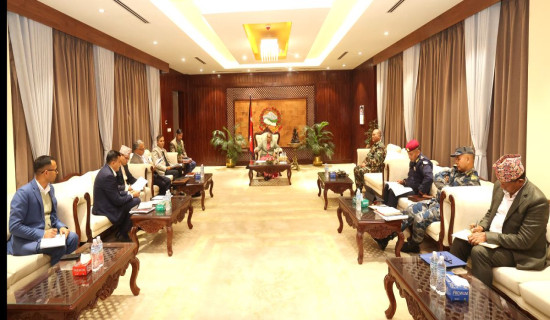
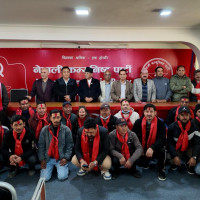

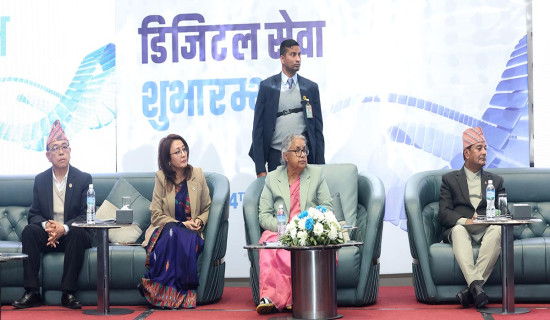
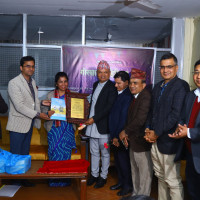

-original-thumb.jpg)

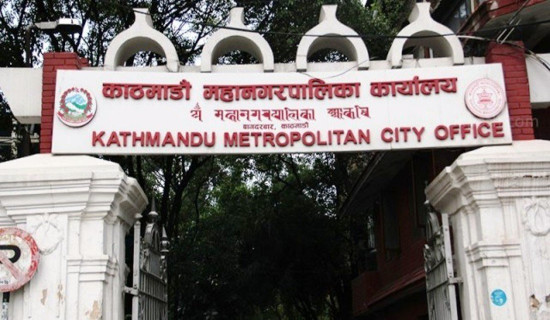

-original-thumb.jpg)


